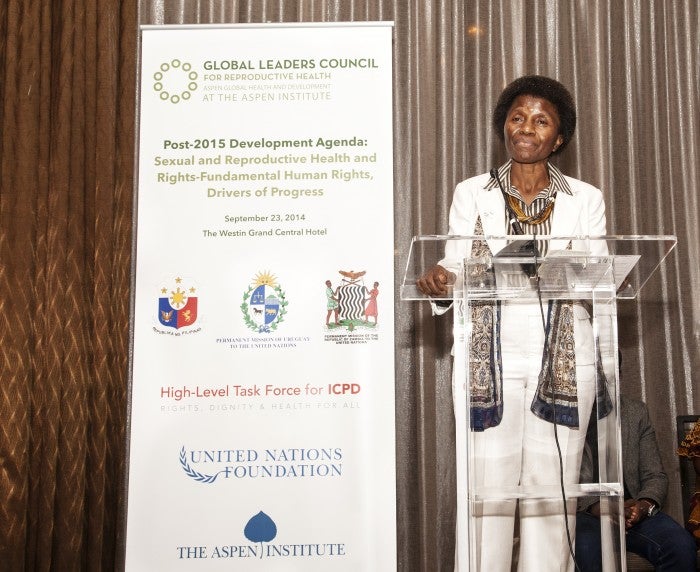The Millennium Development Goals (MDGs) missed an important opportunity. Sexual and reproductive health and rights (SRHR) were left out of the original goals, though later a target was added on reproductive health access. But important ground was lost: the target on reproductive health is among those least likely to be met by 2015.
As United Nations Member States draft the post-2015 development framework that will follow the MDGs, they have the opportunity to put SRHR at the center of the agenda, from the start.
Access to SRHR “strengthens every other effort to improve the human condition. It is linked to improvements in education, gender equality, health, economic development and the environment,” said Peggy Clark, Executive Director of Aspen Global Health and Development and Vice President of Policy Programs at the Aspen Institute.
To raise the profile of this critical issue, the Global Leaders Council for Reproductive Health (GLC), the High-Level Task Force for ICPD, the United Nations Foundation, and the UN Missions of the Philippines, Uruguay, and Zambia convened a high-level dialogue “Post-2015 Development Agenda: Sexual and Reproductive Health and Rights – Fundamental Human Rights, Drivers of Progress.” At the convening, which coincided with the 69th session of the United Nations General Assembly, ten global leaders made the case for including SRHR in the post-2015 development framework and its function as a catalyst to achieving a broad range of development goals.

The Honorable Dr. Tedros Adhanom Ghebreyesus, Ethiopia’s Minister of Foreign Affairs, asserted that the benefits of reproductive health radiate outward from women to their families and nations. “A healthy family, a family with a better quality of life is the start to a healthy and prosperous nation,” He said.
Twenty years ago, at the International Conference on Population and Development (ICPD) in Cairo, 179 governments agreed that SRHR is critical to the well-being of individuals, communities, and the world. As Dr. Musimbi Kanyoro, President and CEO of the Global Fund for Women observed: “Gender equality, reproductive health, development, and all of this has everything to do with what it means for us to be human together. And what else could you ask for, than be human together?”
However, the landscape has since shifted and the place of SRHR in the post-2015 agenda remains unclear. “We have the solutions that can address these challenges. Our biggest challenge is whether we choose to use these solutions or not,” explained theHonorable Joy Phumaphi, former Minister of Health from Botswana, and Chair of the GLC.
Her Excellency Tarja Halonen, Former President of Finland and Co-Chair of the High-Level Task Force for ICPD, clearly articulated the imperative of taking action for SRHR and the impact of doing so. “When these rights are upheld, women, girls and young people can complete education, get better jobs with better wages, and rise to their full potential in economic, political and social life. So, Investing in SRHR is a very smart investment.”
Young people are an important population when considering the contours of this framework. Ghanaian youth activist Samuel Kissiemphasized that there is “no way” to justify a new development framework that does not address the interests of young people. Those interests, he said, have been “clear and resounding” throughout various global consultations. Dr. Christine Kaseba-Sata, the First Lady of Zambia, urged the audience to “empower these girls to finish their education… we need to avail to them age-appropriate, comprehensive sexuality education.”
The Honorable Joy Phumaphi closed the night with an important message. “Are we ready for change?” she asked. “Then let’s make that change. We have 15 years to deliver, and women have been waiting. They cannot wait any longer. The young girl cannot wait any longer. Let us deliver that change.”

